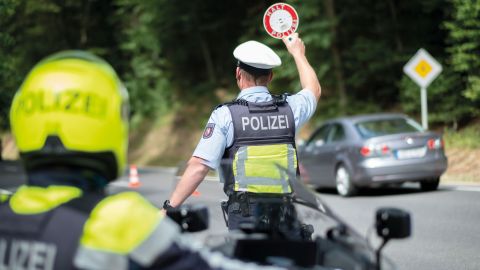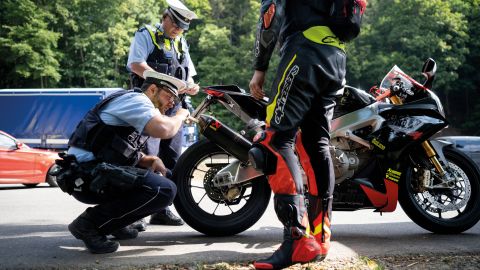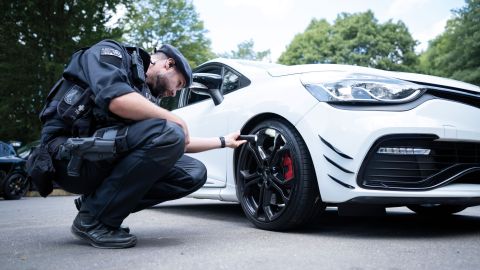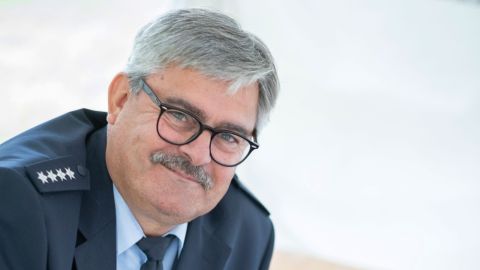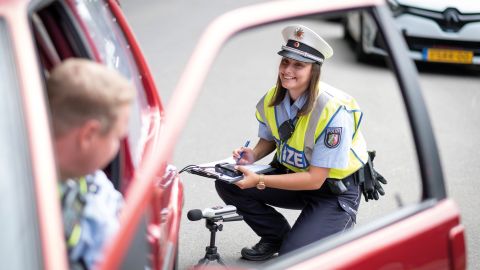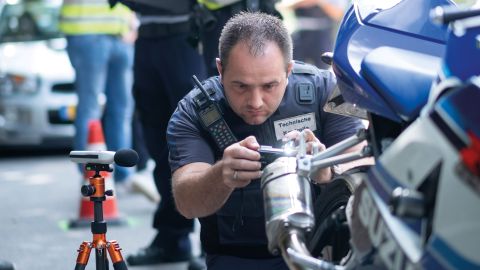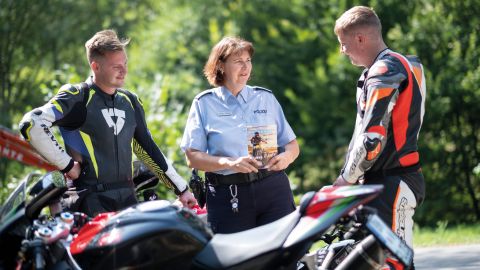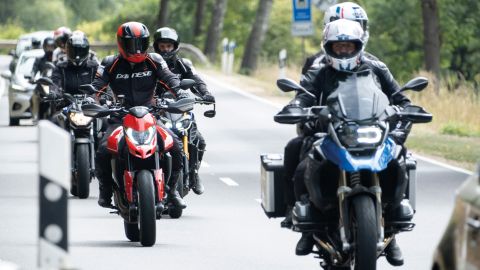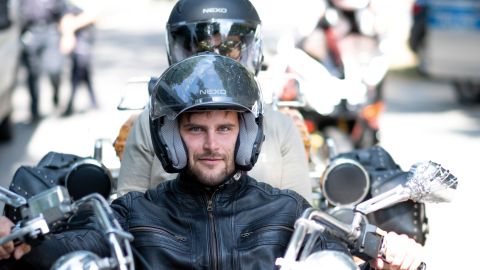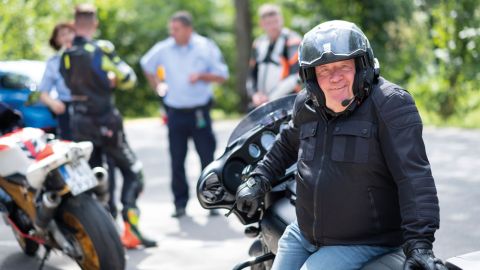Dark forests, clean air and wild streams attract holidaymakers to the Eifel in droves. It is considered a tourist magnet because of its untouched nature. However, some visitors interpret the word "adventure region" differently. They don't want to discover the landscape, they want to discover themselves. By revving the engines of their vehicles. On the last Sunday in August, the Formula 1 race in Spa-Francorchamps, Belgium, and the German Touring Car Masters at the Nürburgring attracted thousands of horsepower enthusiasts to the low mountain range. Curious characters, some in rocker jackets, roll over the asphalt and meet at filling stations. Bikers dominate the scene on this gloriously beautiful day. It smells of freedom and adventure. The police do not stand idly by and watch this hustle and bustle in this recreational paradise. For the first time, hooligans - whether in a car or on a motorcycle - are to be dealt with on a broad front. Without spoiling the fun for others, of course. The comparatively small Euskirchen district police authority is organizing a road safety day, which has been joined by the surrounding districts. The Euskirchen police take on the coordination between the departments. The guidelines are: sanction and prevention.
Statistics show just how dangerous testing one's own limits can be, especially for motorcyclists. Tuned vehicles are almost impossible to control in traffic. Motorcyclists are often victims of excessive speed. Last year, they were involved in 67 accidents in the Euskirchen district alone. Two of these accidents were fatal.
Police officer Wolfgang Eifinger, Head of the Traffic Directorate, and Tido Janssen, Head of the Command and Control Center, want to send out a clear message with their team. Speeding should no longer be worthwhile in this unique landscape. Belgium and Rhineland-Palatinate are on board. The federal police, the criminal investigation department, colleagues from the riot police, the THW and the German Red Cross are also involved.
"The scene will be randomly checked at 13 locations in an area of 8,000 square kilometers," says Chief Superintendent Janssen, summarizing the campaign. "The road safety campaign spans states, countries and authorities." It is a great feeling to have the full backing of all network partners. "It's a real pleasure."
The respective district police authorities in the region act on their own authority. In the 1,249 square kilometer district of Euskirchen, two checkpoints have been set up on the B 258. More than 50 officers are on duty.
One control section is between Milzenhäuschen and Blankenheimer Wald. 100 kilometers per hour are permitted there. A car driver who is flashed is later measured at a speed of 167 km/h and a motorcyclist at 162 km/h. This results in driving bans.
A few kilometers south of this is the second post, not far from the Rhineland-Palatinate state border. Here at Neuhof, only 50 km/h is permitted in a bend. The officers record the speed with a laser device. However, the focus is on the technical inspection. "We also like to pick out conspicuous cars and bikes," says Janssen, explaining the procedure.
Most of those being measured take it with late summer cheerfulness. Even Zoe and Sascha. They live nearby. Their trike with a spray-painted leopard skin pattern was too fast. But only a little. "We know that the police have been here before," they wonder about their carelessness. They don't want to get angry. "I guess it happens," says Zoe. And prefers to talk about a nice weekend in a treehouse chalet that is just behind them.
Christoph (20) and Fabi (23) are also waved out on their Italian Aprilia bikes. There's nothing to complain about on their speedsters. They want to go to the Nürburgring. "We'll do a lap there later," says the younger one.
His RSV 1000 RR with its twin-cylinder V-engine easily reaches 250 kilometers per hour. He never tries out all that power on a public road, he assures us. "I'm not tired of life." Oncoming traffic forces him to be careful and cautious. "You can only go to the limit on a pure race track."
Nevertheless, the boys from Brühl are in no hurry and chat animatedly with police chief inspector Anke Weber. The 52-year-old is responsible for prevention at the Euskirchen traffic directorate. In a casual but determined Berlin tone and with a lot of heart, she explains what you need to bear in mind if you want to get home safely. She knows that if you turn a screw, you can already upset the balance of your vehicle.
Anke Weber comes from East Berlin and left the GDR in 1989 shortly before reunification. She joined the police in the Rhineland shortly afterwards. She has a lot of sympathy for motorcyclists: "I also cruise around on a comfortable BMW tourer myself." Her two daughters are also bikers. She herself is no longer quite as passionate about it as she used to be, she admits: "As a victim protection officer, I've seen too much misfortune."
The police chief inspector tells Christoph and Fabi about a serious accident a few weeks ago. Someone was no longer able to hold on to their bike and it flipped upright on the bend. "There was nothing left to iron out," she says, describing the course of the accident. The man was taken away by helicopter. "Terrible."
The two bikers listened attentively to the policewoman. And finally thank her for being treated so kindly. "We've seen it very differently," Fabi remarks. Then they grab a few of the information brochures on offer and ride on.
Cruiser Wilhelm is one of the quiet connoisseurs in the parking lot. The Hessian sits contentedly on his jet-black Harley Davidson Street Gilde. He has just bought the chopper.
The 64-year-old from Bad Soden thinks the campaign is "great". He has just arrived from Maastricht in the Netherlands and now wants to go home. Everything was fine with him too. "It's right that the police make sure the rules are followed," he says. "There's just too much happening on our roads."
That's not to mention the noise that the Eifel residents have to deal with on Saturdays and Sundays. The chief police inspector accompanies the seizure of vehicles that have been noticed during the inspection of technical modifications.
Three years ago, the district of Euskirchen, in cooperation with the police authority, issued a decibel-oriented catalog of fines to get the situation under control. This scale of charges is unique in Germany. If you tamper with your car or motorcycle, it can now become extremely expensive.
Wilful technical tampering invalidates the operating license. The fine doubles from 90 to 180 euros. If the stationary noise of the vehicle after tolerance deduction is more than 2 dB(A) - the unit of measurement for the sound pressure level - above the permitted level, the fine increases by 50 euros per dB(A). "You can quickly end up with more than 1,000 euros," states First Chief Superintendent Robert Schmitz.
180 of these proceedings have already taken place in Euskirchen since then. 70 percent involved car drivers, 30 percent bikers. Christoph Weber - no relation to Anke Weber - works as a motor vehicle inspector for the local police. He usually has a feeling when something is wrong during the checks. The measurement usually confirms the suspicion. After the seizure, an expert checks the result again with a calibrated device so that the values are legally binding.
Specialist Weber strolls past a motorcycle and describes the trick of how the vehicle was modified. "The decibel eater has been removed here," he says. "Removing it gives more power and more sound. This is actually only intended for the race track." He then points to a BMW from Belgium a few meters away. "Here, the entire exhaust system has been replaced by a continuous pipe. This makes the sound loud and unbearable."
The results of the day are later reflected in the authority's press report. A total of twelve vehicles were seized at the Euskirchen police station because the permitted noise levels had been significantly exceeded. Incidentally, the BMW in question was the inglorious front-runner with 101.3 decibels. 83 decibels would have been permitted. The driver has to pay a fine of 1,300 euros. In addition, there are costs for towing, the expert and the return journey, which has to be laboriously organized.
At the Neuhof checkpoint alone, 134 vehicles were also speeding. A 36-year-old from Neuwied was extremely unpleasant. He had to blow into a breathalyzer and had two per mille alcohol in his blood. A blank gun, a one-handed knife and a baseball bat were in his car, ready to hand.
Wolfgang Eifinger drew a very positive conclusion at the end of the Road Safety Day. "The situation here is still tense. But all institutions are pulling together. We from the police are increasing the pressure to carry out checks and are thus achieving a considerable effect," says the head of the department.
Prevention expert Anke Weber also emphasizes a second aspect. "We treat people decently in the district and don't fold them up. This has proven itself once again."
